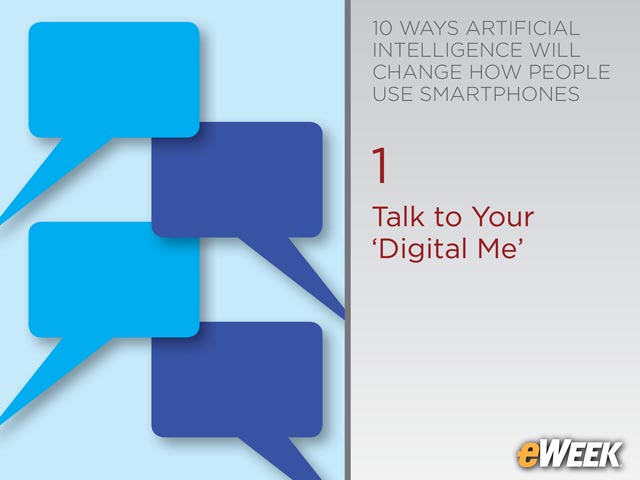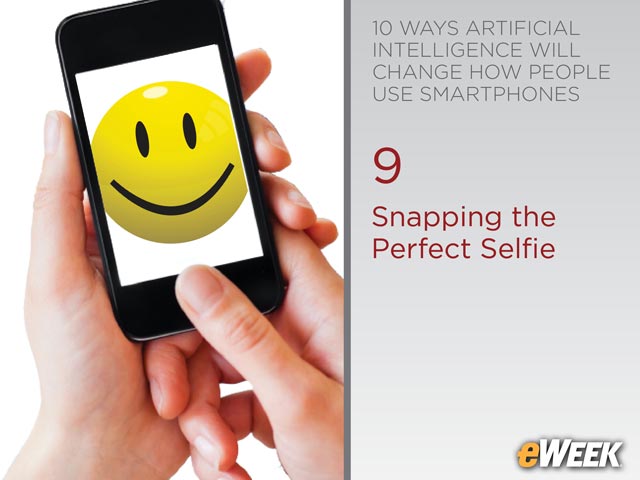eWEEK content and product recommendations are editorially independent. We may make money when you click on links to our partners. Learn More.
110 Ways Artificial Intelligence Will Change How People Use Smartphones
The ability of Artificial intelligence to enhance the user experience will play an increasingly important role in smartphones, according to a recent study from market researcher Gartner. The company said that 80 percent of all smartphones will come with built-in artificial intelligence features by 2022. These features will be capable of identifying a person’s emotions and more effectively processing voice commands. Gartner envisions a future in which the smartphone will be capable of solving user problems and ultimately help people by “reducing their cognitive load.” However Gartner cautioned that AI has some growing up to do as it evolves over the next several years. But the research firm believes AI could dramatically change the mobile handset experience. This eWEEK slide show will describe how.
2Talk to Your ‘Digital Me’
Gartner believes artificial intelligence will allow the smartphone to become an extension of the user’s personality. In its prediction for the future of smartphones, Gartner said that it believes handsets will be able to “understand who you are, what you want, when you want it, and how you want it done.”
3AI Will Fortify User Authentication Procedures
Gartner argues that traditional, password-based authentication isn’t as secure as it could be. Gartner predicts that AI will enable smartphones be able to evaluate a smartphone user’s behavior to sense whether that person is actually authorized to access the handset. If not, even a correct password wouldn’t be enough to unlock a handset.
4Smartphones Will Be Able to Sense User Emotions
5Speak the Way You Want
Being forced to use specific commands with virtual personal assistants can be annoying. But Gartner believes that artificial intelligence will get better with “natural-language understanding,” allowing users to issue a command however they like. The feature could also be helpful with on-the-fly language translation.
6A Smartphone That Sees
A growing number of smartphones will utilize artificial intelligence to deliver enhanced augmented reality features, according to Gartner. The researcher believes augmented reality features can be used in a health care setting where a phone collects information about a patient and artificial intelligence is used to help doctors diagnose and treat an illness.
7Improving Smartphone Performance, Stability
Gartner ultimately believes that artificial intelligence will improve smartphone performance. Without any user interaction, a “smart” handset will be capable of analyzing how it performs, which apps use too many resources and how users interact with programs. All of that data will be used to create a unique smartphone experience that’s tailored to the user and optimizes performance and stability.
8AI-Enabled Phones Will Collect More Data Than Ever
Privacy advocates might not be so fond of artificial intelligence finding its way into smartphones. According to Gartner, future handsets could “collect data for behavioral and personal profiling.” Based on where a person is and what he or she is doing at the time, the smartphone could respond by showing different apps or displaying information. Gartner believes the feature could also be used by insurance companies to analyze how a person drives and adjust car insurance rates accordingly.
9AI Could Enable Dynamic Content Censorship
In an attempt to keep children safe — or enforce local laws — artificial intelligence could also be used for content detection and censorship, according to Gartner. Artificial intelligence features could identify what a person is looking at and match it against settings either on the device or on the network to determine whether it should be accessible.
10Snapping the Perfect Selfie
11AI-Driven Smartphones Could Even Help Stop Snoring
In addition to watching users, artificial intelligence might also be used to listen to them. Gartner envisions a future in which AI features would use a handset’s microphone to listen to ambient sounds and perform specific functions based on what the phone hears. If a smartphone hears a user snoring, Gartner said, artificial intelligence features could interact with a phone user’s smartwatch “to encourage a change in sleeping positions.”










